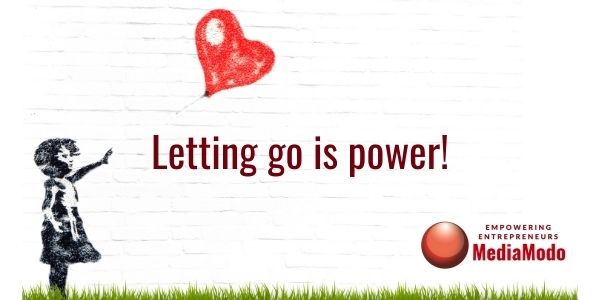How did that happen? One minute 2020 was back-to-back groundhog days and now we’re about to wave it all goodbye…
Which brings to mind how ‘letting go’ is a huge competitive advantage for founders – if you can deploy it – and a better way to approach 2021 New Year’s resolutions too!
So, on the 31st December this year, my suggestion is that, instead of promising to make and keep additional commitments, why not commit to stop doing a bunch of stuff instead?
Stop doing stuff is wildly cathartic! And, the space we gain by no longer spending our time, energy and money on something distracting or irrelevant, makes space for something else, something new to happen.
That is why letting go is one of the most powerful actions you can take as a founder, to accelerate growth.
Don’t you love that? The most powerful thing you can do is ‘not do’ something! So why is it hard to say ‘goodbye to all that’? I’ve encountered a variety of reasons, but they tend to fall broadly into these categories;
- fear of upsetting someone or losing approval
- an inability to cut loses (see the article about founders escaping mazes)
To overcome the first of these, sometimes we just need to adopt the attitude of ‘not giving a sh*t’ – (see the book of that name) – sometimes, you just have to not care too much.
The second, inability of cut loses, is a well know human trait – where we hang onto something we’re heavily invested in, because once-upon-a-time, it was a good idea! Here, overcoming our human nature is only possible with practice and often some coaching or mutual support arrangement.
The startup world has been talking about ‘stop doing’ a lot lately. Although, it is framed as ‘successful founders say no’, it is actually part of the same behaviour of growth startups…
…because, saying ‘no’ means that founders can focus – laser like – on the one problem they are solving – so that they gain competitive advantage.
As Steve Jobs said, ‘focus is about saying no‘.
Paul Graham of Y Combinator goes further: the only dangerous competitors are focused ones! (In other words, do not fear the competitors who started ahead of you, have a big US VC backers or are making all the noise – only, think about the highly focused ones!)
Focus, as Steve Jobs said, is about saying no.
The only dangerous competitors are focused ones.
Ergo there are things that even the most dangerous competitors say no to, and it would be worth thinking explicitly about what those are.
— Paul Graham (@paulg) December 5, 2020
Saying ‘no’ or ‘goodbye… to all that’ is a key step to being focused.
So, instead of loading your diary up with more well meaning new things to do in the new year, why not off-load a bunch of stuff that doesn’t serve you well, or simply, holds you back from focusing on the one thing that really matters¬?
(¬Note, this usually involves letting go of the one thing that really mattered last year – but no longer does – because you’ve gained new insight / evidence and/or the world has just changed).
Why is focus a competitive advantage?
So why is focus a competitive advantage? Because most people and most businesses struggle to do it! Especially larger more corporate organisations where an individual’s career path is connected to the success of a previous promise…which rewards them for not changing tack.
In a startup, we are rewarded when we are agile – or, change track, because new evidence or insight demand that we do so.
Hence, when you write an investment pack or speak to an investor and are asked to give your competitive advantage – tell them, ‘our ability to focus’! And be ready to provide examples…
Oh, and move to the country – with good broadband – offices in big cities are not coming back – on this topic, in 2020, we really did say ‘Goodbye to All That’; see more on Twitter here...
So ask yourself this coaching question:
What will you stop doing in 2021
(so you can focus on the one thing that matters)?
* Goodbye to All That is the 1929 autobiographical novel of Robert Graves about his experiences of the growing up in England at the beginning of the 20th century, war and then his eventual escape to live on the Spanish island of Mallorca! Why do Englishmen need to escape…to Spain?!?




